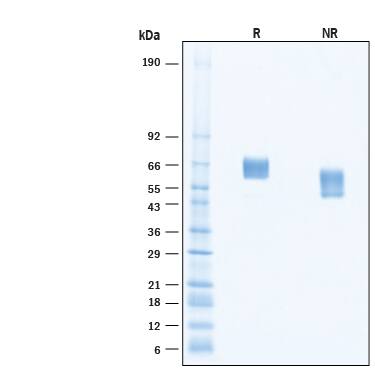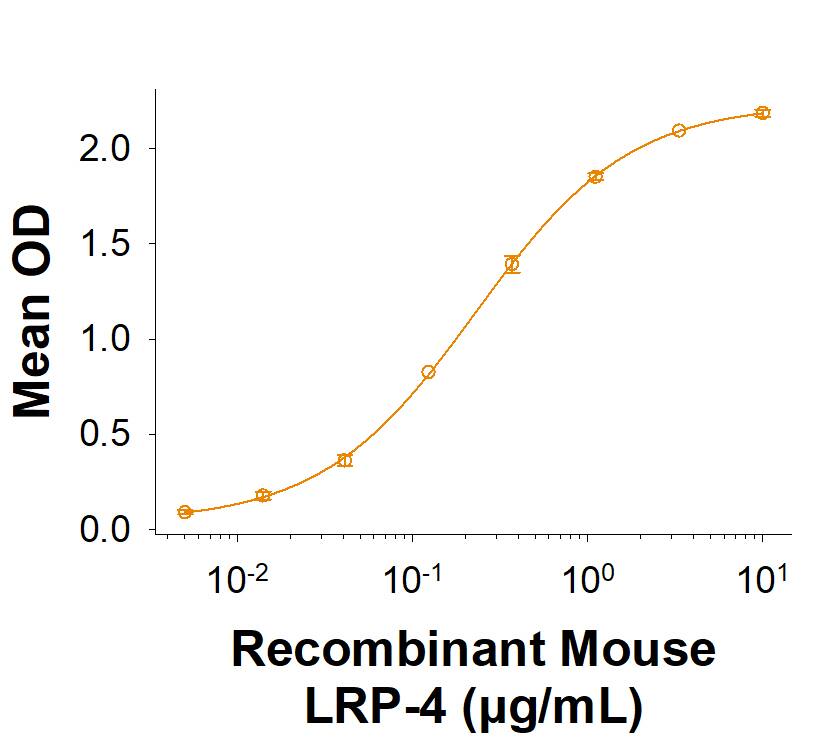Recombinant Mouse MuSK His-tag Protein, CF
R&D Systems, part of Bio-Techne | Catalog # 11519-MK

Key Product Details
Product Specifications
Source
Human embryonic kidney cell, HEK293-derived mouse MuSK protein
Glu22-Thr494, with a C-terminal 6-His tag
Glu22-Thr494, with a C-terminal 6-His tag
Purity
>95%, by SDS-PAGE visualized with Silver Staining and quantitative densitometry by Coomassie® Blue Staining.
Endotoxin Level
<0.10 EU per 1 μg of the protein by the LAL method.
N-terminal Sequence Analysis
Glu22
Predicted Molecular Mass
53 kDa
SDS-PAGE
63-69 kDa, under reducing conditions.
Activity
Measured by its binding ability in a functional ELISA.
Recombinant Mouse MuSK His-tag binds to Recombinant Mouse LRP-4 His-tag (Catalog # 10229-LR) and Agrin His-tag with a ED50 of 0.0800-0.800 μg/mL.
Recombinant Mouse MuSK His-tag binds to Recombinant Mouse LRP-4 His-tag (Catalog # 10229-LR) and Agrin His-tag with a ED50 of 0.0800-0.800 μg/mL.
Scientific Data Images for Recombinant Mouse MuSK His-tag Protein, CF
Recombinant Mouse MuSK His-tag Protein Binding Activity.
Recombinant Mouse MuSK His-tag Protein (Catalog # 11519-MK) binds to Recombinant Mouse LRP-4 His-tag Protein (10229-LR) and Agrin His-tag Protein with an ED50 of 0.0800-0.800 μg/mL.Recombinant Mouse MuSK His-tag Protein SDS-PAGE.
2 μg/lane of Recombinant Mouse MuSK His-tag Protein (Catalog # 11519-MK) was resolved with SDS-PAGE under reducing (R) and non-reducing (NR) conditions and visualized by Coomassie® Blue staining, showing bands at 63 - 69 kDa.Formulation, Preparation and Storage
11519-MK
| Formulation | Supplied as a 0.2 μm filtered solution in PBS with Trehalose. |
| Shipping | The product is shipped with dry ice or equivalent. Upon receipt, store it immediately at the temperature recommended below. |
| Stability & Storage | Use a manual defrost freezer and avoid repeated freeze-thaw cycles.
|
Background: MuSK
References
- Valenzuela, D.M. et al. (1995) Neuron 15:573.
- Finn, A.J. et al. (2003) Nat. Neurosci. 6:717.
- Nasrin, F. et al. (2014) Sci. Rep. 4:6841.
- DeChiara, T. et al. (1996) Cell 85:501.
- Kim, N. et al. (2008) Cell 135:334.
- Banerjee, S. et al. (2011) Development 138:3287.
- Amenta, A.R. et al. (2012) J. Neurosci. 32:2324.
- Otsuka, K. et al. (2015) Scientific Reports 5:13928.
- Zhang, B. et al. (2008) Neuron 60:285.
- Yilmaz, A. et al. (2016) Science Signaling 9:ra87.
- Zhang, W. et al. (2011) J. Biol. Chem. 286:40624.
- Burden, S.J. et al. (2017) CSH Perspectives Biol. 5:a009167.
Long Name
Muscle-specific Receptor Tyrosine Kinase
Alternate Names
EC 2.7.10, EC 2.7.10.1, MGC126323, MGC126324, muscle, skeletal, receptor tyrosine kinase, MuSK, skeletal receptor tyrosine-protein kinase
Gene Symbol
MUSK
UniProt
Additional MuSK Products
Product Documents for Recombinant Mouse MuSK His-tag Protein, CF
Product Specific Notices for Recombinant Mouse MuSK His-tag Protein, CF
For research use only
